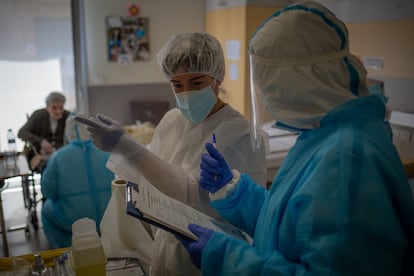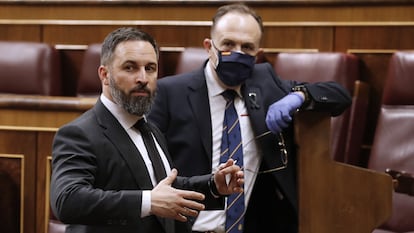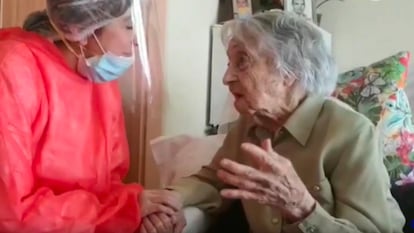Daily coronavirus-related deaths in Spain rise to 176, but remain below 200 for fourth day in a row
For the first time, three Spanish regions – the Balearic Islands, Murcia and La Rioja – as well as the exclave city of Melilla recorded no new Covid-19 cases

The number of daily coronanvirus-related deaths in Spain was at 176 on Tuesday, according to the latest figures from the Spanish Health Ministry. This is the fourth day in a row that Spain has recorded fewer than 200 coronavirus fatalities. The figure was 123 on Monday, 143 on Sunday, and 179 on Saturday. Indeed, Spain has reported fewer than 200 daily coronavirus-related deaths for seven of the past 12 days in May. Only three of Spain’s 17 regions reported more than 10 coronavirus fatalities on Tuesday – Catalonia (66), Madrid (37) and Castilla-La Mancha (25). The total number of victims in Spain now stands at 26,920.
In recent weeks, an uptick in the numbers has come to be expected on Tuesdays, given that figures tend to be underreported on weekends due to the lack of personnel. But this rise is in keeping with the overall downward trend of the outbreak.
What’s more, for the first time, three Spanish regions – the Balearic Islands, Murcia and La Rioja – as well as the exclave city of Melilla in North Africa, recorded no new coronavirus cases. Another six regions reported fewer than 10 new infections on Tuesday.
Speaking at the government’s daily press conference on Tuesday, Fernando Simón, the director of the Health Ministry’s Coordination Center for Health Alerts and Emergencies, said the figures were “very positive, they give us hope.” But he warned: “Cases are still being detected and there is still the risk of transmission, which is why we cannot let our guard down.”
In the past 24 hours, 426 new infections were confirmed via PCR tests, up from 373 on Monday, but below Sunday’s figure of 621. This brings the total number of cases since the beginning of the crisis to 228,030.
The number of coronavirus hospital admissions also confirmed the downward trend of the outbreak. Only Castilla-La Mancha and Madrid reported more than one intensive care admission, with five and 14 respectively. Since the beginning of the crisis, a total of 138,980 coronavirus patients have been discharged from hospital after recovering from the disease.
Simón also spoke about the government’s decision to introduce a 14-day quarantine for international travelers. “In the period when Spaniards had to be confined [to their homes], anybody who arrived had to be confined. Proposing an extra quarantine made little sense,” he explained. But now that around half of Spain has moved to Phase 1 of the deescalation plan, which allows social gatherings of up to 10 people, tighter restrictions are needed, Simón argued. Imported coronavirus cases is the “greatest risk” to the downward trend, he said. “We have to ensure prevention, at least until other countries have our same level of control.”
Vox calls for national protests
The Spanish far-right group Vox has organized 52 protests against the government in all provincial capitals of Spain, as well as in the exclave cities of Melilla and Ceuta in North Africa. The demonstrations are scheduled for May 23, and will be carried out in cars in order to prevent coronavirus contagion, with protesters following a predetermined route in their vehicles.

Vox spokesperson Jorge Buxadé said on Monday that “if [the government] bans them [the protests], it will be proof that they are using the state of alarm to impose a secret state of exception,” in reference to the second of three emergency situations contemplated by the Spanish Constitution: state of alarm, exception and siege.
Vox leader Santiago Abascal, announced last Wednesday in Congress, that he would present his request to organize the protests the following day, but there had been no further news of the demonstrations until now. The date of the protests coincides with the end of the current state of alarm, which is set to expire on May 24, unless it is extended again by Congress.
In recent weeks, Vox has filed a number of complaints against government ministers and public officials. The far-right party has called for three top officials from the health and finance ministry to be charged with alleged corruption in 53 contracts to purchase urgently-needed medical supplies to fight the coronavirus pandemic.
Protest in wealthy Madrid neighborhood
Residents of the wealthy Salamanca neighborhood in Madrid held a protest known as a cacerolada – where people bang pots and pans – to demonstrate against the government’s management of the coronavirus crisis. The protest took place at 9pm on Sunday on Núñez de Balboa street, and coincided with an improvised street party. According to the police, up to 100 people had gathered outside a balcony that was playing the Spanish national anthem. When police came to break up the gathering, which was in violation of the coronavirus confinement measures, residents began to shout “freedom” and “the government must resign.”
Hoy en Madrid gran cacerolada contra el Gobierno social-comunista ...chocante la presencia de la policía ya que se hacía desde los balcones ...”estado de alarma”=Estado policial? pic.twitter.com/TuzudM3Zvh
— Enrique Fdez.-Miranda. Duque de Fernández-Miranda. (@enriquefmiranda) May 10, 2020
Dozens of videos of the incident were shared on social media. Enrique Fernández-Miranda, a duke and the dean of the Council of Spanish Grandees, wrote in a message on Twitter: “Today in Madrid, a large cacerolada against the social-communist government … the presence of police is shocking, given that the protest was held from balconies… ‘state of alarm’ = police state?”
Spain’s oldest woman survives Covid-19

María Branyas, the oldest woman in Spain according to the Gerontology Research Group, has recovered from Covid-19 at the age of 113. This makes her the oldest person in Spain to have survived the disease. Branyas overcame Covid-19 in her home at a senior residence in Olot in the province of Girona. She told Spanish news agency EFE that she is in good health “with small problems that everyone can have,” and expressed her gratitude to the care workers at the residence. “The people here are very friendly, very attentive,” she said. According to her daughter, Rosa Moret, Branyas “is a very strong and positive woman.”
Regions to provide figures on suspected cases
Regions in Spain must send updated figures on suspected and confirmed coronavirus cases to the Health Ministry every day before noon. That’s according to a new government order published Tuesday in the Official State Gazette (BOE). Under the order, regional health authorities will have to send individualized information from the past 24 hours regarding infections in both public and private healthcare facilities. Laboratories authorized to carry out PCR tests or molecular tests must also update their figures every day before noon. The aim of the measure is to provide the government with the data it needs to follow and monitor the coronavirus outbreak.
With reporting by Miguel González.
English version by Melissa Kitson.
Tu suscripción se está usando en otro dispositivo
¿Quieres añadir otro usuario a tu suscripción?
Si continúas leyendo en este dispositivo, no se podrá leer en el otro.
FlechaTu suscripción se está usando en otro dispositivo y solo puedes acceder a EL PAÍS desde un dispositivo a la vez.
Si quieres compartir tu cuenta, cambia tu suscripción a la modalidad Premium, así podrás añadir otro usuario. Cada uno accederá con su propia cuenta de email, lo que os permitirá personalizar vuestra experiencia en EL PAÍS.
¿Tienes una suscripción de empresa? Accede aquí para contratar más cuentas.
En el caso de no saber quién está usando tu cuenta, te recomendamos cambiar tu contraseña aquí.
Si decides continuar compartiendo tu cuenta, este mensaje se mostrará en tu dispositivo y en el de la otra persona que está usando tu cuenta de forma indefinida, afectando a tu experiencia de lectura. Puedes consultar aquí los términos y condiciones de la suscripción digital.








































